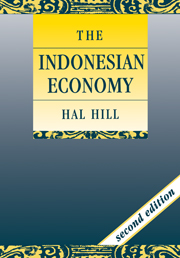Book contents
- Frontmatter
- Contents
- List of Tables
- List of Figures
- Preface and Acknowledgements to the First Edition
- Preface and Acknowledgements to the Second Edition
- Glossary and Abbreviations
- Maps
- 1 Introduction
- 2 An Overview of Economic Development Since 1966
- 3 Money and Finance
- 4 Fiscal Policy
- 5 International Dimensions
- 6 The State and Public Policy: Ideology and Intervention
- 7 Agricultural Modernization
- 8 The Industrial Transformation
- 9 The Services Revolution
- 10 Poverty, Inequality and Social Progress
- 11 The Regional Dimension: Patterns and Issues
- 12 Conclusion: Looking to the Future
- 13 Postscript on the Crisis
- Chronology of Major Economic Events, 1965 to 1993
- Notes
- Bibliography
- Index of Author Citations
- Index
4 - Fiscal Policy
Published online by Cambridge University Press: 05 June 2012
- Frontmatter
- Contents
- List of Tables
- List of Figures
- Preface and Acknowledgements to the First Edition
- Preface and Acknowledgements to the Second Edition
- Glossary and Abbreviations
- Maps
- 1 Introduction
- 2 An Overview of Economic Development Since 1966
- 3 Money and Finance
- 4 Fiscal Policy
- 5 International Dimensions
- 6 The State and Public Policy: Ideology and Intervention
- 7 Agricultural Modernization
- 8 The Industrial Transformation
- 9 The Services Revolution
- 10 Poverty, Inequality and Social Progress
- 11 The Regional Dimension: Patterns and Issues
- 12 Conclusion: Looking to the Future
- 13 Postscript on the Crisis
- Chronology of Major Economic Events, 1965 to 1993
- Notes
- Bibliography
- Index of Author Citations
- Index
Summary
AN OVERVIEW
There are two fundamental differences between fiscal policy in the pre- and post- 1966 eras in Indonesia. The first is that the government has ceased to be the major and direct contributor to inflation. As pointed out in Chapter 1, mounting budget deficits in the first half of the 1960s were immediately monetized by the simple expedient of printing more money. Early in the life of the New Order regime, the government adopted the “balanced budget” principle. Although in a conventional economic sense the government has continued to run budget deficits, the balanced budget rule has been firmly adhered to ever since. It is one of the basic tenets of the regime, and it helps to explain why macroeconomic stability has been broadly maintained since the late 1960s.
The second major difference concerns the size of government. Relative to the rest of the economy, the size of the government sector has risen sharply. As a share of GDP, government revenue and expenditure more than doubled over the decade to 1975. The increases have been essentially revenue-driven, as initially aid flows then rapidly rising oil prices swelled the government's coffers. In the second half of the 1980s, non-oil domestic revenues began to rise significantly. The size and funding of this expenditure has had two immediate and important political implications: the central government has had hitherto unimaginable resources at its disposal, thus reinforcing its political authority.
- Type
- Chapter
- Information
- The Indonesian Economy , pp. 43 - 64Publisher: Cambridge University PressPrint publication year: 2000



